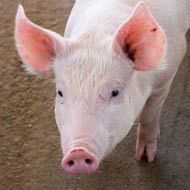
EU member states have been asked to develop action plans outlining how they will tackle tail-biting in pigs.
Under EU legislation, tail docking or reduction of corner teeth must not be carried out routinely unless there is evidence of injuries to sows’ teats or to other pigs’ ears or tails.
Prior to carrying out tail docking, other measures must be taken to prevent tail biting and inadequate environmental conditions or management systems must be changed.
Georgina Crayford, senior policy advisor for the National Pig Association (NPA), attended a European Commission workshop on actions to prevent tail-biting and reduce tail docking.
“It became very clear at the meeting that the Commission is really focusing on this issue at the moment and it is now ramping up the pressure,” she said. “They have asked member states to provide an action plan by January 2018 outlining how they will improve controls on the prevention of tail-biting and avoidance of tail-docking.
“They are not expecting countries to completely stop tail-docking, but they want to see progress and will be conducting missions throughout 2018 to review progress and assess compliance with the legislation.”
The commission wants to see more evidence that farmers are implementing other measures before tail docking, she added.
“In particular, they feel that farmers should be reducing stocking density before docking otherwise they are in breach of the legislation. One of the Commission’s Veterinary Inspectors clearly said the argument sometimes used by farmers that they adhere to the minimum space allowance in the legislation holds no water.”
Governments were also encouraged to set up rural development programmes, accessing pillar two funding to support farmers in their efforts to stop tail docking.
However, Crayford said the NPA is keen to impress on Defra that funding made available to farmers must be flexible, in order to allow them to try a range of measures to stop tail docking, rather than focusing on straw provision and stocking density.
She added: “We will also do our best to ensure that Government’s approach is sensible and that Defra continues to acknowledge that tail-biting is a complex behaviour with no simple solution.”



 The latest
The latest